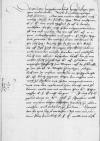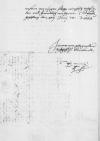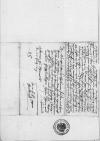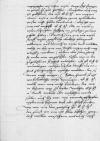Das wir unserm ⌊⌋ nach, / welchs datum(m) den funfften thag may vorschinen, / E(wer) F(urstlichen) D(urchlauch)t was unser ⌊thagfart⌋, dÿ uff s(anct) Stanislai vorblyben, / bisher nicht haben mugen antwurten, / yst ins erst ursach, / das wir uff ⌊ko(nigliche)r m(aieste)t⌋, u(nsers) a(llergnedigsten) hern, widerschreyben und wyllen / zu solcher thagfart / gewartet, / den welchen, so wir uberkomen, / do hin sich zcog, / das sich hie dy hernn ⌊ko(niglich)e rethe⌋ bis uff dyse zceyt derwegen schrifftlich habenn undereinander mussen bereden / und entslossen, durch iren offenen besigelten bryff, / den sy uns nechten spath zugefertigt, ko(niglich)e m(aieste)t zu bytten, / dy vorgangne thagfarth im mayen / uff dy zukunfftige im herbst s(anct) Michel zuvorlegen, / solchen briff wir in unserm vorslossen an hochgedachte ko(niglich)e m(aieste)t durch eygenen bothen den negsten mitwoch zu schickenn uns haben vorgenhomenn. / Was uns dan wyderumb zum bericht wirt zukomen, / wolle wir mit anderer hern ⌊ko(nigliche)n rethen⌋ wyssen E(wer) F(urstlichen) D(urchlauch)t nicht bergen. / Ist auch E(wer) F(urstliche) D(urchlauch)t gesint, etwas an ko(nigliche)n hoff zu schreyben, / wolle wir unserm bothen befhelhen, trewlich zu uberreichen / und antwurt zu furdren. / Dyweyl dan dy czeit sich so vorloffen, / byt wir mit sondrem fleis freuntlich, E(wer) F(urstliche) D(urchlauch)t wolle uns auss  GStA PK, HBA, C1, No. 576, 2 unnumbered angeczeygten ursachen unser lange styl sweygen in gunst zu gut halthen, / derhalben auch nach yst geblybenn, / das wir E(wer) F(urstlichen) D(urchlauch)t von wegenn etwan unsers underthans, eynnes vorlaukenten prister, nicht haben beantwurt. / Auch het wir uns wol vorhofft, E(wer) F(urstliche) D(urchlauch)t solte an unserm ersten schreyben dysfhals ein gunstigen genugen gehabt haben, / nemlich so er uns aus unser straff, unsere geystliche oberkeyt belangend, / entkomen, / und darnach im unser ⌊land⌋ vorbotten, / welchs im bey uns von rechts wegen nicht mag erlassen werdenn. / Andern aber seins gleich, dÿ unser uns nie gesessen, / lassen wir in der zugelassenen freyheyt unbelastet. / Es yst E(wer) F(urstlichen) D(urchlauch)t unvorborgen, / welchen dy stat ⌊Danczke⌋ aus nahent gleichmesigen ursachen vorbotten, / das sy dorein nicht mugen. / Bytten hirumb, / so vyl wir freuntlicher weys vormugen, / E(wer) F(urstliche) D(urchlauch)t wolde von uns nicht furdren, / das uns in keynenn weg zu leyden, / welchen E(wer) F(urstliche) D(urchlauch)t ir ⌊landt⌋ vorbeut ader vorbythen wirdt, / sollen auch bey uns, / wy vormals geschryben, / wyderumb keynnen trost ader hulff finden, / wy wir uns dan gentzlich zu E(wer) F(urstlichen) D(urchlauch)t, der gunst wir uns mit fleis befelhen, / genczlich wollen vorsehenn / und auch noch
GStA PK, HBA, C1, No. 576, 2 unnumbered angeczeygten ursachen unser lange styl sweygen in gunst zu gut halthen, / derhalben auch nach yst geblybenn, / das wir E(wer) F(urstlichen) D(urchlauch)t von wegenn etwan unsers underthans, eynnes vorlaukenten prister, nicht haben beantwurt. / Auch het wir uns wol vorhofft, E(wer) F(urstliche) D(urchlauch)t solte an unserm ersten schreyben dysfhals ein gunstigen genugen gehabt haben, / nemlich so er uns aus unser straff, unsere geystliche oberkeyt belangend, / entkomen, / und darnach im unser ⌊land⌋ vorbotten, / welchs im bey uns von rechts wegen nicht mag erlassen werdenn. / Andern aber seins gleich, dÿ unser uns nie gesessen, / lassen wir in der zugelassenen freyheyt unbelastet. / Es yst E(wer) F(urstlichen) D(urchlauch)t unvorborgen, / welchen dy stat ⌊Danczke⌋ aus nahent gleichmesigen ursachen vorbotten, / das sy dorein nicht mugen. / Bytten hirumb, / so vyl wir freuntlicher weys vormugen, / E(wer) F(urstliche) D(urchlauch)t wolde von uns nicht furdren, / das uns in keynenn weg zu leyden, / welchen E(wer) F(urstliche) D(urchlauch)t ir ⌊landt⌋ vorbeut ader vorbythen wirdt, / sollen auch bey uns, / wy vormals geschryben, / wyderumb keynnen trost ader hulff finden, / wy wir uns dan gentzlich zu E(wer) F(urstlichen) D(urchlauch)t, der gunst wir uns mit fleis befelhen, / genczlich wollen vorsehenn / und auch noch  GStA PK, HBA, C1, No. 576, 3 unnumbered unserm vormugen solchs wirglich beschulden und freuntlich vordynen(n). /
GStA PK, HBA, C1, No. 576, 3 unnumbered unserm vormugen solchs wirglich beschulden und freuntlich vordynen(n). /
 GStA PK, HBA, C1, No. 576, 4 unnumbered
GStA PK, HBA, C1, No. 576, 4 unnumbered  GStA PK, HBA, C1, No. 576, 1 unnumbered
GStA PK, HBA, C1, No. 576, 1 unnumbered GStA PK, HBA, C1, No. 576, 2 unnumbered angeczeygten ursachen unser lange styl sweygen in gunst zu gut halthen, / derhalben auch nach yst geblybenn, / das wir E(wer) F(urstlichen) D(urchlauch)t von wegenn etwan unsers underthans, eynnes vorlaukenten prister, nicht haben beantwurt. / Auch het wir uns wol vorhofft, E(wer) F(urstliche) D(urchlauch)t solte an unserm ersten schreyben dysfhals ein gunstigen genugen gehabt haben, / nemlich so er uns aus unser straff, unsere geystliche oberkeyt belangend, / entkomen, / und darnach im unser
GStA PK, HBA, C1, No. 576, 2 unnumbered angeczeygten ursachen unser lange styl sweygen in gunst zu gut halthen, / derhalben auch nach yst geblybenn, / das wir E(wer) F(urstlichen) D(urchlauch)t von wegenn etwan unsers underthans, eynnes vorlaukenten prister, nicht haben beantwurt. / Auch het wir uns wol vorhofft, E(wer) F(urstliche) D(urchlauch)t solte an unserm ersten schreyben dysfhals ein gunstigen genugen gehabt haben, / nemlich so er uns aus unser straff, unsere geystliche oberkeyt belangend, / entkomen, / und darnach im unser  GStA PK, HBA, C1, No. 576, 3 unnumbered unserm vormugen solchs wirglich beschulden und freuntlich vordynen(n). /
GStA PK, HBA, C1, No. 576, 3 unnumbered unserm vormugen solchs wirglich beschulden und freuntlich vordynen(n). /



